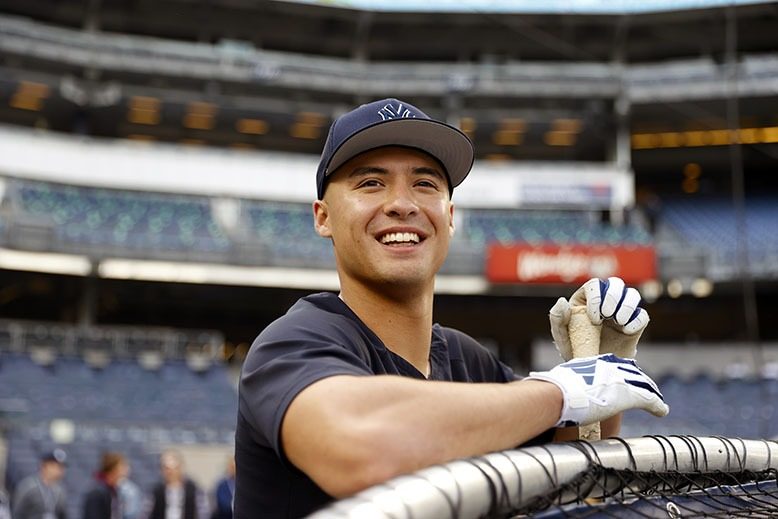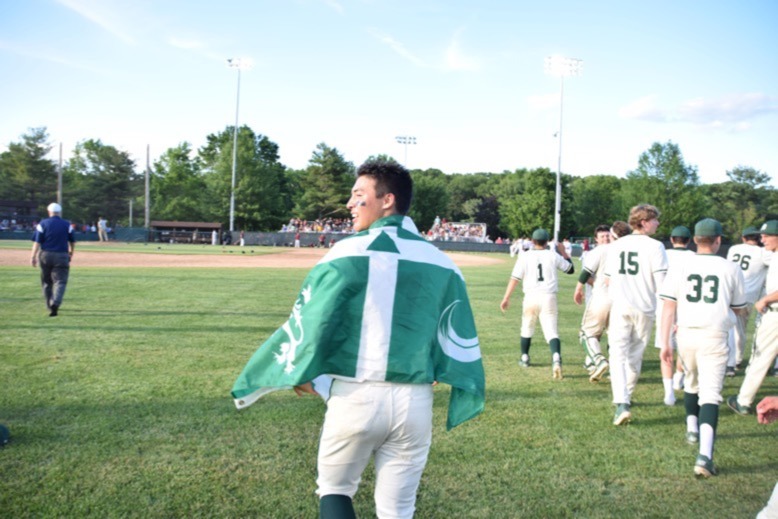
The first time Anthony Volpe experienced Little League baseball, it didn’t go too well. He was about 9, and he had been playing the sport ever since he could walk, often with older kids. Hanging out with a bunch of novices who could barely put their uniforms on properly wasn’t too appealing.
“He hated it,” says Michael Volpe, his father.
When Volpe was a toddler, his father would roll him balls in the hallway of their Manhattan apartment. A family friend gave Volpe a souvenir New York Yankees bat, and he would hit his dad’s pitches in the living room. “We used magazines for bases,” Michael Volpe says. When he got a little older, Volpe joined his father at a nearby park to play ball “from morning until night.” A group of about 20 kids eventually gathered with them, and Michael Volpe pitched to everybody.
“[Anthony] was so much more advanced,” Michael Volpe says. “He played more than all the other kids combined. He really latched onto it at an early age.”
Volpe’s passion continued to grow over the years, eventually leading him to Yankee Stadium, where the 22-year-old from Watchung (where the family moved when he was in fourth grade) is the starting shortstop for Major League Baseball’s most legendary franchise. Those long hours spent at the park presaged a baseball journey during which Volpe would dazzle coaches, players, parents and, ultimately, scouts with his talent. But just as important were his work ethic, commitment and respectful approach to the game. Volpe won state titles and gold medals. He starred on school teams and elite travel outfits. He represented his country through USA Baseball.
In 2019, the Yankees chose him in the first round of the MLB Draft. Four years later, Volpe plays the position that had belonged for 20 years to his hero, New Jersey native Derek Jeter. Volpe isn’t Jeter, but the success he enjoyed while growing up certainly recalls the Yankee Hall of Famer.
“He’s a unicorn,” says Bruce Shatel, Volpe’s high school coach at the Delbarton School in Morristown. “It’s in his DNA. Everything he does is excellent.”

Volpe played high school baseball at the Delbarton School in Morristown. Photo: Courtesy of the Delbarton School
Early on, Volpe displayed remarkable defensive skills and otherworldly instincts for the game. As he grew older, his power hitting and speed improved. When Volpe was in sixth grade at Valley View Middle School, he was so good that then coach Matt Buglovsky allowed him to play on the school’s team, which had previously been open only to seventh- and eighth-graders. “As a sixth-grader, he was probably the best one on the team,” Buglovsky says.
Volpe was also an outstanding student. “He never received a B grade,” says Shatel, who taught Volpe geometry in ninth grade and accounting in 12th.
Volpe started all four years he was at Delbarton, one of the state’s top schools for athletics. Coaches of high-powered travel teams from hundreds of miles away recruited him. He began playing for USA Baseball at 12. Volpe liked other sports, but baseball was his year-round fascination.
“I can’t be more thankful to have had a first-row seat to watch him develop from a ninth-grader to a Major League prospect,” Shatel says. “It was a treat to watch him develop into a special player.”
Kyle Wagner went into Red Land High School in central Pennsylvania one Monday morning about a dozen years ago and told a fellow teacher, “We just played against a future big leaguer.”
Wagner’s friend laughed.
“Kyle, they’re 10 years old,” he said. “You can’t say that.”
Yes, he could. Wagner’s GoWags travel team had faced the Flemington-based Diamond Jacks squad for which Volpe played, and the coach was impressed. How impressed? Through the parent of a GoWags player who knew the Volpes, Wagner reached out and asked if Anthony wanted to join his squad—which was based in central Pennsylvania. (GoWags is a collection of nine travel teams of players aged 10-18.) Over the next four years or so, in addition to playing for local travel, USA Baseball and school squads, Volpe trekked two-plus hours for GoWags practices.
“I drove him to Harrisburg on weekends,” Michael Volpe says. “I felt it was important for him to practice with the team. Coach Wagner ran the best practice I ever saw. He made baseball so much fun.”
Volpe had superior confidence and the ability to think about the game at a level well beyond his peers. He inspired his teammates to work harder, and that made everyone better.
“It would be Friday night, and here is this kid showing up at our facility from Watchung, New Jersey,” Wagner says. “You could hear parents tell their kids, ‘This kid is traveling here. I don’t want to hear your excuses.’ You could feel it: Anthony’s here. Bring your A game.”

Volpe started all four years he was at Delbarton. Photo: Courtesy of the Delbarton School
Wagner wasn’t the only travel-team coach to recruit Volpe. He also played for the Houston-based Banditos and the Virginia-based Canes, perhaps the nation’s premier amateur outfit. Volpe spent two seasons—before his junior and senior high school years—with the Canes, who have had more than 40 alumni reach the Major Leagues, according to Jeff Petty, coach of the under-18 squad. Even in a group of all-stars, Volpe stood out.
“His leadership qualities were as good as I’ve seen, and I’ve been doing this 18 years,” Petty says. “He was always locked in, not just to winning the game, but wanting to win every inning and every pitch. It was elite.”
Volpe never abandoned his schools. At Valley View in Watchung, Volpe was so good that Buglovsky told his uncle he had a player “who was the next Derek Jeter.” Buglovsky says Volpe never missed a middle school practice and always rooted for his teammates. “He was the perfect kid,” Buglovsky says. “He was a kid you hope your kids are like. He was hardworking, respectful, nice to everybody, and as humble as could be.”
Shatel says it was “easy to root for him,” and that opposing coaches “would be impressed with his ability level but also how he carried himself.” Michael Volpe insists neither he nor his wife, Isabella, both of whom are physicians, ever spoke with their son or his 20-year old sister, Olivia —whom Michael Volpe calls “the best athlete in the family”—about how to behave on teams. “We never had to sit him down to talk about how to treat people,” Michael Volpe says. “That’s just the way he was. We never had problems with him talking down to other kids.”
The summer after his seventh-grade year, Volpe attended a camp at Delbarton and impressed Shatel with his defense. “His glove-to-hand speed was unbelievable,” Shatel says. Because Volpe was undersized, he didn’t hit for power. He instead sprayed line drives all over the field. That changed as he got older. What didn’t need to improve was his desire to work. Volpe was always hitting and fielding grounders after practice. “And he was the best bunter ever,” Shatel says.
Volpe played second base as a freshman at Delbarton and shortstop his next three years there. The Green Wave won state titles in 2017 and 2019, and by then, college coaches and pro scouts were highly interested in him. Shatel says “10 or so MLB cross-checkers” were at every game to see Volpe, as well as Jack Leiter, a pitcher whom Texas chose second overall in the 2021 MLB Draft. Volpe committed to play for Vanderbilt, an excellent university with a great baseball program.
Then, the Yankees stepped forward.
Matt Hyde began scouting for Volpe’s favorite team in 2005 and had learned about the shortstop while following various USA Baseball outfits. As the Yankees’ lead Northeast region scout, Hyde began tracking Volpe more closely in the summer of 2017, when Volpe earned a spot on a team in the Area Code Games in California, which brought together top prospects from all over the country and were run by MLB scouts. Volpe’s talent was obvious, but Hyde was more impressed with how much Volpe could be constantly “in the moment,” something Hyde says only the absolute best athletes can do.
“He has an amazing ability to be present and not stray into distractions or what’s next,” Hyde says. “That really translates to success. You don’t go beyond the next pitch or the play or the situation. The guys who can do it don’t let anything take them away from what’s right in front of them. All the good ones have it.”
The Yankees chose Volpe 30th overall in 2019 and gave him a $2.7 million signing bonus. After being selected by the Yankees, Volpe began a minor-league sojourn that featured time with five teams in three seasons. (There was no minor-league ball in 2020.) Included was last year’s 110-game stint with the AA Somerset Patriots, in Bridgewater, for whom Volpe hit .251 with 18 homers, convincing the Yanks he was ready to compete for a starting job in the Majors.
Hyde believes Volpe would be comfortable with Yankees greats of the 1940s, ’50s and ’60s, like Yogi Berra and Mickey Mantle (his grandfather’s favorite player), and the 1970s Reggie Jackson-led World Series champs. “He’s a winner,” Hyde says. “He’s got a Major League smile.”
Big success with the Yankees is not guaranteed, but the long list of those impressed with his development bodes well for future achievements.
“We found over time that the differences between good prospects and Major Leaguers are reliability and availability,” Hyde says. “Reliability means they show up every day. Availability means they are there when you need them.
“That’s Anthony. He’s going to be there. He’s going to be prepared. He’s going to show up and bring energy and do his job. That’s who he is.”
And who he has always been.
Michael Bradley is a writer based in suburban Philadelphia and an assistant instructor at Villanova.
No one knows New Jersey like we do. Sign up for one of our free newsletters here. Want a print magazine mailed to you? Purchase an issue from our online store.



